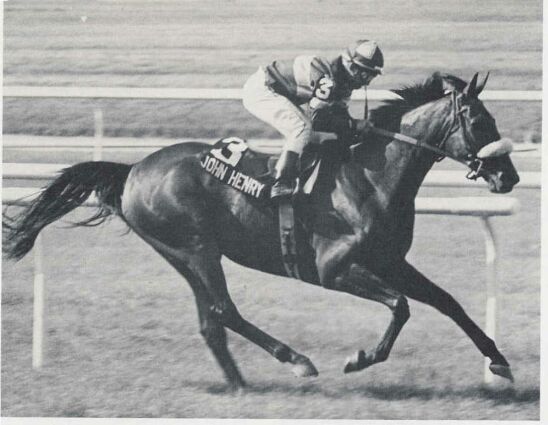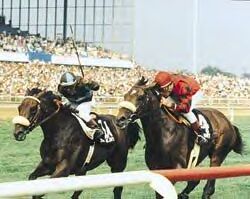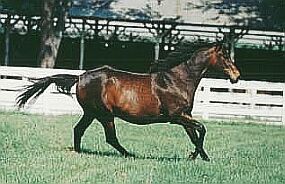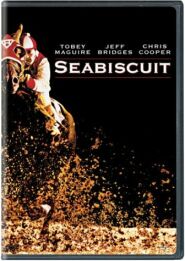

The mighty bay gelding John Henry was foaled March 9, 1975 at the Golden Chance Farm in Paris, Kentucky. His sire, Ole Bob Bowers, had won only one stakes race, the Tanforan Handicap, and his dam, Once Double, was an unplaced daughter of 1946 co-Juvenile Champion Double Jay. It seemed unlikely that John Henry would become a stakes winner. His breeding, at first glance, was relatively humble, although Double Jay was well bred, and his conformation was far from perfect, with calf knees being his most glaring physical shortcoming. Yet despite early doubt, the gelding won thirty nine races and more than six and a half million dollars.
Aptly named for the legendary steel driver who wouldn't quit, John Henry was truly the Horse of Steel.
John Calloway bought John Henry at public auction for $1,100 in January of 1976, his decision based solely on Once Double's pedigree. Her second dam was by Mahmoud, whose dam Mah Mahal was by English Triple Crown winner Gainsborough out of a mare by The Tetrarch, that undefeated legend who was often described as a freak of nature.
Calloway sold John Henry at auction, and Harold Snowden paid a sum of $2,200 for the two-year-old and gelded him. The horse then exchanged hands again when trainer Phil Marino of Louisiana took a liking to the horse's unruly spirit and smooth way of going, paying $10,000 in the name of a partnership.
In John Henry's first race, a maiden special weight at Jefferson Downs, he actually walked out of the starting gate when the doors flew open, making his lack of racing experience obvious. The gelding made up for it, however, catching the leader in the homestretch to win by a nose. Next came a fast closing third in allowance company, then a second on a sloppy track. John Henry lost his rider in in an overnight handicap, and then shipped to Evageline Downs.
There, he won an allowance race and scored another place finish, then ran in his first stakes race, splashing down the muddy homestretch at Evangeline Downs to win the Lafayette Futurity by a head. His owners made a profit.
After a couple of months off, John Henry returned to the races at the Fairgrounds. He repeatedly ran out of ground in six furlong events, losing nine in a row. His owners decided it was time to sell.
John Henry's former owner Harold Snowden paid $25,000 to buy the horse back, and ran him in an allowance race at Keeneland. The horse ran fourth, then was sold for the same price to Sam Ruben, who remained John Henry's owner for the rest of his incredible career.
In 1978, the trainer at Sam Ruben's Dotsam Stable was Bob Donato, who entered John in a twenty five thousand dollar claiming race at Aqueduct on May 2. John Henry won easily by two and a half lengths. He was next tried on the turf at Belmont. Appreciating both the surface and the added distance, John won by fourteen lengths.
After an allowance win, John Henry found himself back in stakes company. He ran third in Monmouth's Lamplighter Handicap, second to Darby Creek Road in the Hill Prince Handicap at Belmont, and second again in the grade II Lexington Handicap.
At Saratoga, John Henry tired in an allowance event, again beat by Darby Creek Road, and missed again ten days later despite being back on the turf. After finally seeing the winner's circle again after an allowance race at Belmont, John Henry headed west.
He won the Round Table Handicap at Arlington by twelve lengths. Apparently, the margin wasn't impressive enough for his whip happy jockey, and Sam Ruben fired the rider in the winner's circle.
It was on to Santa Anita, where John Henry got caught in traffic and finished third in the Volante Handicap, then finished sixth after holding the early lead in the mile and a quarter C F Burke Handicap. Star of Erin was the winner. In his final race of the season, John Henry won the Chocolatetown Handicap at Penn National.
Lefty Nickerson and Ron McAnally took over John Henry's training in 1979, and the horse began the season with a strong second in a six furlong allowance race at Monmouth. Ten days later, the distance stretched to a mile and John Henry won by fourteen lengths.
Out of the money in the Massachusetts Handicap at Suffolk Downs, John Henry next finished second in the Sunrise Handicap at Atlantic City. He was second again in the Sword Dancer at Belmont, beaten again by his old nemesis Darby Creek Road.
After running fourth in a sloppy Capital City Handicap at Penn National, John Henry again went to Saratoga, where he returned to the turf an won an allowance event. He ran on the turf again at Belmont, and the result was the same. Lefty Nickerson sent John Henry to Santa Anita, where Ron McAnally was based.
The gelding ran second in the C F Burke Handicap, the won the HP Russell Handicap. He was second in the Bay Meadows Handicap in his final start at the age of four.
1980 began with John Henry's first graded win. He won the San Gabriel Handicap by head while giving the runner up twelve pounds. Three weeks later he won the San Marcos Handicap on the dirt, scoring by two and a half lengths.
John Henry traveled to Florida for the Hialeah Turf Cup, and the trip proved worthwhile. He took the lead early in the mile and a half race and held it to win by a half length.
Back in California, John Henry went to post in his first grade I event, and drew away to beat Relaunch by a length and a half in the mile and a half San Luis Rey Stakes.
The distance increased for the San Juan Capistrano Handicap, and John Henry didn't mind a bit. He came home the winner by a length and a quarter.
Next came the Hollywood Invitational Handicap, at a mile and a half on the turf. Assigned 128 pounds, John Henry gamely fought off Balzac to win by a neck. It was his sixth straight win.
John Henry rejoined Lefty Nickerson in New York, and carried 128 pounds again in Belmont's Bowling Green Handicap. Suffering some interference, John was beaten a short neck by the lightly weighted Sten, to whom he was giving eleven pounds, but he was a full length ahead of the talented Lyphard's Wish, winner of the United Nations Handicap.
At even weights in the Sword Dancer Stakes, John Henry easily bested Sten, beating him by five lengths, but was himself beaten by Tiller, and again settled for second money.
The pattern didn't continue. With Angel Cordero, Jr. in the saddle, John Henry won the Brighton Beach Handicap, then left the grass to run in the Jockey Club Gold Cup.
Temperence Hill was the leader of the three-year-old colts, having won the Belmont and the Travers Stakes. While he couldn't catch the star colt, John Henry solidly beat the rest of the field. After a third place effort in Aqueduct's Turf Classic, in which he was paired with Laffit Pincay, Jr. for the first time, John Henry returned to Santa Anita, where he finished the 1980 season with at win in the Oak Tree Invitational. Having won eight of twelve races that year, John Henry earned the Turf Championship, but the best was yet to come.
A four race winning streak started off a dynamite 1981 season. First came an easy score in the San Luis Obispo Handicap. Next, John Henry won the Santa Anita Handicap by a length despite giving away eleven or more pounds. The San Luis Rey Stakes proved another easy win.
In the Hollywood Invitational Handicap, John Henry carried 130 pounds for the first time, but still scored by three-quarters of a length.
The streak ended in the Hollywood Gold Cup, where John Henry closed fast on the far outside, but ran out of ground and finished fourth. It was the last time he was ridden by Laffit Pincay.

John Henry made up for the loss by shipping to Belmont Park and winning the Sword Dancer Stakes by three and a half lengths.
Bill Shoemaker, having guided the gelding to victory
in New York, rode him again in Chicago. After slipping
near the start, John Henry seemed hopelessly beaten in the
Arlington Million. Yet with gameness and determination he
 ran down The Bart, winner of the Hialeah Turf Cup and the
San Gabriel Handicap, with a brilliant closing drive. The
gallant gelding got his nose in front just in time for
victory.
ran down The Bart, winner of the Hialeah Turf Cup and the
San Gabriel Handicap, with a brilliant closing drive. The
gallant gelding got his nose in front just in time for
victory.
He finished out the season with a win each on dirt and grass. He took the Jockey Club Gold Cup from Peat Moss and the champion mare Relaxing, then crossed the country to take the Oak Tree Invitational with his old rival The Bart third. At the end of the year John Henry had eight wins to his credit, and he was rewarded with his first Horse of the Year title. He also won Eclipse Awards as Champion Older Male and Champion Turf Horse. His seasonal earnings of $1,798,030 brought his lifetime total to $3,022,810 and made him the world's leading money winner.
The mighty Horse of Steel ran only six times in 1982 due to an injury, yet he still won the Santa Anita and Oak Tree Handicaps. He also traveled abroad to run in the Japan Cup, and while he finished out of the money, he did give a good accounting of himself in the early fractions. He was then out of action for seven months.
July 4, 1983 found John Henry ready to race again, once again with a new regular rider. This time, it was Chris McCarron, who rode him for the remainder of his career. The pair won the American Handicap at Hollywood by a length and a quarter, then ran a game second in the Arlington Million, missing by just a neck.
After running out of the money in Slew o' Gold's Jockey Club Gold Cup, John Henry met Zalataia for the first time in the Oak Tree Inviational. He was second in a good effort, then turned around and beat Zalataia in the Hollywood Turf Cup. With his lifetime earnings reaching $4,255,210, John Henry was named the 1983 Turf Champion.
In 1984, at the age of nine, the mighty gelding was back for still another grueling season. In his first start that year, he was beaten by champion Interco and Kentucky Derby winner Gato Del Sol in the Santa Anita Handicap after stumbling out of the gate. He was third behind the same pair in the San Luis Rey.
The great horse redeemed himself by setting a new course record in winning the Golden Gate Handicap, covering the mile and three eighths in 2:13. John Henry next won the Hollywood Invitational Handicap under the high weight.
In the Hollywood Gold Cup, John ran a game second to Desert Wine, a four year old son of Damascus who had been the juvenile star of the west coast in 1982, and had run second in both the Kentucky Derby and the Preakness Stakes at three. Following the Gold Cup, John scored a driving victory in the Sunset Handicap.
The Arlington Million had a strong field, including the champion mare Royal Heroine as well as Gato Del Sol, yet John Henry made it look easy, drawing off to win by a length and three quarters.
He held off Win to take the Turf Classic by a neck in stirring stuggle, then went to New Jersey to win the Ballantine Scotch Classic Handicap while giving away weight to younger horses. In an outstanding stretch run, John Henry blew past his rivals and galloped off to win by two and three quarter lengths.
That was his thirty ninth victory, and he became the oldest horse to be honored as the Horse of the Year, having earned more than six and a half million dollars.
John Henry was only the second horse to be Horse of the Year in non-consecutive years, the first being Native Dancer in 1952 and 1954, and for several years he was the All-Time Leading Money Winner with a total of $6,591,860. This honor was passed to Alysheba, and now belongs to Cigar.
Retired in 1985, John Henry became a pensioner at
Kentucky Horse Park in Lexington, attracting thousands of
visitors every year. A brief comeback attempt was aborted
when he tore a suspensory ligament before he even went to
post. The mighty gelding became a member of the Hall of
Fame in 1990, the same year as Ron McAnally.
a pensioner at
Kentucky Horse Park in Lexington, attracting thousands of
visitors every year. A brief comeback attempt was aborted
when he tore a suspensory ligament before he even went to
post. The mighty gelding became a member of the Hall of
Fame in 1990, the same year as Ron McAnally.
On October 8, 2007, John Henry passed away at the age of thirty-two, when veterinarians could no longer keep him comfortable in the face of kidney failure. He will be buried at the Kentucky Horse Park.
If you read only one tribute to John Henry, read Amy Zimmerman's in Blood-Horse.
| Year | Starts | Wins | Seconds | Thirds | Earnings |
|---|---|---|---|---|---|
| Lifetime | 83 | 39 | 15 | 9 | $6,591,860 |
| Ole Bob Bowers | Prince Blessed | Princequillo | Prince Rose |
| Cosquilla | |||
| Dog Blessed | Bull Dog | ||
| Blessed Again | |||
| Blue Jeans | Bull Lea | Bull Dog | |
| Rose Leaves | |||
| Blue Grass | Blue Larkspur | ||
| Camelot | |||
| Once Double | Double Jay | Balladier | Black Toney |
| Blue Warbler | |||
| Broomshot | Whisk Broom II | ||
| Centre Shot | |||
| Intent One | Intent | War Relic | |
| Liz F. | |||
| Dusty Legs | Mahmoud | ||
| Dustemall |



This text protected by all applicable copyright laws. Do not duplicate or distribute without written permission. © Spiletta42.